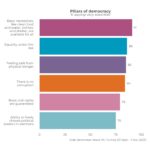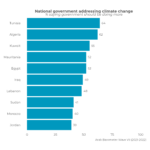Press Release
Key findings from MaryClare Roche, PhD‘s new blog :
- Levels of disagreement with the idea that men make better political leaders than women is at an all-time high in eight of the eleven countries for which Arab Barometer has trend data.
- However, these changes are not just young people with more equal gender views coming of age. Instead, the data make clear that MENA citizens are changing their views as they age. Specifically, most age groups in the vast majority of countries have become less likely to agree that men are better political leaders than women now compared to at least 10 years ago.
- The greater representation of women in political office appears to be a key component in the growing confidence of citizens in female political leadership. In part, this is likely due to the greater visibility of women in these positions. Four states in the region – Tunisia, Egypt, Lebanon, and Palestine – have allowed women positions of authority following elections and these are some of the countries where we have seen the greatest differences. In contrast, in Algeria women have nominally been allowed to participate but without any real path to inclusion. In turn, women are effectively prevented from demonstrating their capabilities and there has been relatively little commensurate change in views of women in political leadership.
- Arab Barometer compared a nationally representative cross-section of different age groups in eight MENA countries to see how their opinions on women in politics have changed since they were first surveyed at least 10 years ago. The surveyed countries are Algeria, Egypt, Iraq, Jordan, Lebanon, Palestine, Sudan, and Tunisia. The three studied age cohorts are Cohort I (18-29 year-olds), Cohort II (30-39 year-olds), and Cohort III (40-49 year-olds).
Additional key findings include:
Tunisia:
- Tunisian citizens experienced the most dramatic opinion shift across age groups in the region in the last 10 years. For example, only 41% of Tunisians who are in their forties today agree that men are better political leaders compared to 77% of them when they were in their thirties just ten years ago. Similarly, Tunisians in their fifties have dramatically shifted their views on women’s political leadership capabilities. Only 37% of them in 2022 think that men are more suited for political positions compared to 71% of them when they were ten years younger in 2012.
- The introduction of the legislative gender quotas in Tunisia in 2011 and the appointment of Najla Bouden as the first female prime minister in 2021 have coincide with the sharp decline in Tunisians who prefer men in positions of political power than women, underscoring the importance of the demonstration effect of having women in these positions.
Egypt:
- Egyptians went from having the highest agreement (91%) that men are better political leaders than women among surveyed countries in 2011 to only the fifth highest agreement (66%) in 2022. Egyptians of all age groups experienced a significant opinion shift over time.
- More women entered parliament from 2011 to 2022 coincides with the dramatic decline in Egyptians who think men are better than women at political leadership.
Algeria:
- Algeria is the only country where the overall population is more likely to agree (76%) that men make better political leaders than women in 2022 than they were the first time they were surveyed in 2006 (70%).
- The drastic increase in women’s political representation since the introduction of gender quotas in 2011 without an increase in fundamental support for women’s rights led to fierce backlash. The gender quota failure seems to have caused Algerians to increase their belief in differential political capabilities due to gender.
- However, Algerian women have recently gained faith in female political leaders. Levels of agreement among Algerian women has dropped ten points over the last six years, with 64% of Algerian women saying that men are better suited to hold political office than women in 2022 compared to 74% of them in 2016.
Palestine:
- Palestine is the only country where the youngest cohort (ages 18-29) had the largest proportion agreeing (90%) that men are better political leaders than women in 2006. That age group also had the biggest change among Palestinian age groups (a 27-point drop in agreement).
Age cohorts by gender:
- When the cohorts are broken out by gender, we see that men and woman have experienced a similar level of shifts in their views. Women tend to have slightly more drastic changes, but not always.
- In all but two countries (Iraq and Algeria), men in every age cohort has become more favorable toward women in political power over time.
- In Lebanon specifically, a larger percent of men than women changed their minds in each cohort. Likely, this result is due to the fact that women in Lebanon, just like in every MENA country, are significantly more likely than men to disagree that men are better political leaders, meaning men have had more ground to make up in supporting gender equality. Additionally, although the change in Lebanese men’s opinion is greater than Lebanese women, the difference is not substantial. For example, the views of Lebanese men in the 30-39 age group dropped 12 points while the views of Lebanese women in the 30-39 age group dropped 11 points. As such, broadly speaking, the views of men and women in Lebanon have changed in parallel.



